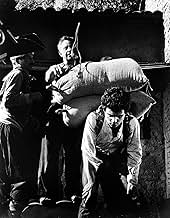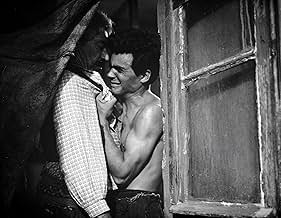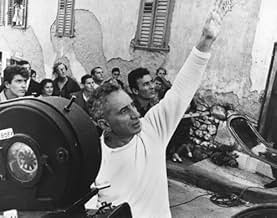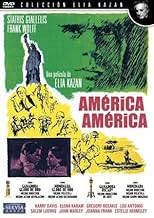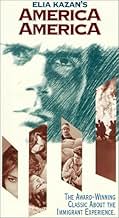VALUTAZIONE IMDb
7,7/10
6307
LA TUA VALUTAZIONE
Un giovane greco si ferma su una rotta sicura per l'America.Un giovane greco si ferma su una rotta sicura per l'America.Un giovane greco si ferma su una rotta sicura per l'America.
- Regia
- Sceneggiatura
- Star
- Vincitore di 1 Oscar
- 7 vittorie e 12 candidature totali
Garrett Cassell
- Dog Walker
- (non citato nei titoli originali)
Tom Holland
- Voice Overs
- (voce)
- (non citato nei titoli originali)
Elia Kazan
- Self
- (voce)
- (non citato nei titoli originali)
Recensioni in evidenza
Imagine a film like "The Godfather" receiving almost no audience, relegated to the occasional appearance on the AMC channel, barely being released on VHS or DVD, and you will have some idea of the tragic fate of this lost epic masterpiece. As hard as it is to believe, this may be the prolific director Elia Kazan's greatest film achievement, yet hardly anyone has seen it. This is a film on the epic scale of "The Godfather," about a young Armenian man's escape from Turkish persecution, flight from Anatolia, and eventual immigration to Ellis Island - all based upon the the experiences of the director's uncle. What is also tragic is the fact that I can think of no other film which portrays the cruel persecution and genocide inflicted upon the Armenian minority by the Ottoman Turks in the early 20th century (which Hitler correctly pointed to as proof that the world would look the other way at the genocide he had planned in Europe in the 1930s). Every period detail in the film is perfect, from the Oscar-winning costume design to the set design, Greek folk music score, veteran Haskell Wexler's cinematography, and acting - especially lead actor Giallelis, whose intensity brings to mind some of Brando's early work.
It is obvious that this film was a very personal piece of film-making for Kazan. And though I don't want to dwell as others do on Kazan's checkered past in his naming of communist colleagues for HUAC in the 1950s, it is interesting to note a parallel in the main character Stavros' personal anguish in making the choice to leave his wealthy wife and use her money to immigrate to the United States; both men made the conscious decision to drive a wedge between them and their past relationships. This is truly a film for all Americans to treasure, and if I had my way, I would make sure it was broadcast every 4th of July just as "It's a Wonderful Life" is broadcast every Christmas. As a nation of immigrants and descendants of immigrants, this is a film virtually every American can relate to. I can't figure out why it is so obscure.
It is obvious that this film was a very personal piece of film-making for Kazan. And though I don't want to dwell as others do on Kazan's checkered past in his naming of communist colleagues for HUAC in the 1950s, it is interesting to note a parallel in the main character Stavros' personal anguish in making the choice to leave his wealthy wife and use her money to immigrate to the United States; both men made the conscious decision to drive a wedge between them and their past relationships. This is truly a film for all Americans to treasure, and if I had my way, I would make sure it was broadcast every 4th of July just as "It's a Wonderful Life" is broadcast every Christmas. As a nation of immigrants and descendants of immigrants, this is a film virtually every American can relate to. I can't figure out why it is so obscure.
While I am not sure I'd consider this to be Elia Kazan's best film, it certainly ranks up there with his best--which is saying a lot considering he's the same guy who brought us "On The Waterfront", "A Streetcar Named Desire" and "Rebel Without a Cause". As for Kazan himself, this was his favorite film as it's the story of his uncle--a man who busted his butt to get himself to America around the turn of the century.
When the movie begins, Kazan himself narrates and explains that the story is about the man who is responsible for him and his family immigrating to the US. His story begins in Turkey. It's around the time in history when the Turks were about to wipe out most of the Armenians--and things for other minorities in their land (in this case, the Greeks) weren't very good either. So, a family decides to send their oldest son, Stavros (Stathis Giallelis), to Constantiople to earn his fortune--and to be able to afford to eventually bring them all to America...and freedom. Stavros is a very, very determined man...but also quite naive. Again and again, he's used by people and left with nothing. But, he's an amazingly resilient guy and soon he's willing to do just about anything to make the money he needs to take the ship to America.
While the story is rather simple, it's handled exquisitely. You can really tell that it's a labor of love, as the story unfolds very slowly and patiently. This is NOT a complaint-just a statement about the writer/director's style in the movie. It's really great what he was able to achieve with mostly inexperienced actors and non-actors. Perhaps Giallelis' performance is a bit too quiet and even stilted...but it is hard to imagine that he wasn't even an actor! Overall, it's a beautiful tale--and one of the most American of movies because it tells a story of immigration that most of us in the US can relate to. Even though my family was not Greek, so much of the rest of the film is pretty typical of what other poor families like my own probably went through on their way to a new land. Well worth seeing and a nice history lesson.
When the movie begins, Kazan himself narrates and explains that the story is about the man who is responsible for him and his family immigrating to the US. His story begins in Turkey. It's around the time in history when the Turks were about to wipe out most of the Armenians--and things for other minorities in their land (in this case, the Greeks) weren't very good either. So, a family decides to send their oldest son, Stavros (Stathis Giallelis), to Constantiople to earn his fortune--and to be able to afford to eventually bring them all to America...and freedom. Stavros is a very, very determined man...but also quite naive. Again and again, he's used by people and left with nothing. But, he's an amazingly resilient guy and soon he's willing to do just about anything to make the money he needs to take the ship to America.
While the story is rather simple, it's handled exquisitely. You can really tell that it's a labor of love, as the story unfolds very slowly and patiently. This is NOT a complaint-just a statement about the writer/director's style in the movie. It's really great what he was able to achieve with mostly inexperienced actors and non-actors. Perhaps Giallelis' performance is a bit too quiet and even stilted...but it is hard to imagine that he wasn't even an actor! Overall, it's a beautiful tale--and one of the most American of movies because it tells a story of immigration that most of us in the US can relate to. Even though my family was not Greek, so much of the rest of the film is pretty typical of what other poor families like my own probably went through on their way to a new land. Well worth seeing and a nice history lesson.
I saw America America way back when I was a teen and had not seen it since till
today. I was surprised at how much I remembered of it. It was like reliving tales
told by my grandparents and some of their siblings of their immigration stories.
In this case this was fashioned tales of Elia Kazan's parents and their siblings woven together to create an immigrant story. It's not pretty at times and the black and white cinematography accents the harshness of the experience.
Kazan's protagonist is young Stathis Giallelis and a few familiar character actors are in the cast. No box office names though to accent the reality of the story. Giallelis is a Greek in Turkish Anatolia, a place where during the Ottoman Empire persecuting Greeks and Armenians was a national pasttime. Not that persecution led to any kind of solidarity, the two minorities had it in for each other as much as the Turks.
Giallelis hears of America, a fabled land where this sort of organized persecution and permanent status at the bottom of society doesn't happen. He resolves to go, but his family only sends him as far as Istanbul (as Greeks they still call it Constantinople)to help out one of the relatives.
He hears the fare is 110 English pounds and one way or another he's going.
The last 15 minutes or so is when Giallelis arrives and there's a compelling montage of immigrants including our protagonist doing all kinds of menial jobs that we who are here won't do. It's no different today with the current folks who want to come here, the ones our current administration is bent on scapegoating for its own purposes. Look folks, that montage tells more than the Kazan family story. it's your story or mine unless you were born an American Indian.
And speaking for the Kogans, Lucyshyns, Scrobacks, and Fleischmans, I'm glad Elia Kazan made America America and told the tale.
In this case this was fashioned tales of Elia Kazan's parents and their siblings woven together to create an immigrant story. It's not pretty at times and the black and white cinematography accents the harshness of the experience.
Kazan's protagonist is young Stathis Giallelis and a few familiar character actors are in the cast. No box office names though to accent the reality of the story. Giallelis is a Greek in Turkish Anatolia, a place where during the Ottoman Empire persecuting Greeks and Armenians was a national pasttime. Not that persecution led to any kind of solidarity, the two minorities had it in for each other as much as the Turks.
Giallelis hears of America, a fabled land where this sort of organized persecution and permanent status at the bottom of society doesn't happen. He resolves to go, but his family only sends him as far as Istanbul (as Greeks they still call it Constantinople)to help out one of the relatives.
He hears the fare is 110 English pounds and one way or another he's going.
The last 15 minutes or so is when Giallelis arrives and there's a compelling montage of immigrants including our protagonist doing all kinds of menial jobs that we who are here won't do. It's no different today with the current folks who want to come here, the ones our current administration is bent on scapegoating for its own purposes. Look folks, that montage tells more than the Kazan family story. it's your story or mine unless you were born an American Indian.
And speaking for the Kogans, Lucyshyns, Scrobacks, and Fleischmans, I'm glad Elia Kazan made America America and told the tale.
The picture talks about a Greek young from Anatoly ( Turkey ) named Stavros ( Stathis Giallelis ). He is sent by his father to Constantinopla for helping their family . Howewer Stavros only thinks on America . Across the journey he will suffer several misfortunes , risks and odds in his relationships to friends (Frank Wolff, John Marley, Lou Antonio) and enemies . Later on , Stavros will work in laborious employments to obtain a passage in a splendid ship for the promised land.
The movie is a magnificent adaptation based on the autobiographic novel of Greek-Turkish director Elia Kazan who being a child emigrated along with his family to United States . Since the initiating he describes memories , emotions and infancy images , besides narrates the persecution to Greeks and Armenians by Turkish that finished in genocide . Kazan reflects the particular characters , rural sets in realism way , folkloric customs , glimmer landscapes as well as interior homes . Kazan achieved a real emotion and sensibility by means of slow-moving scenes and close-ups of protagonists full of dialogs dealing with essential feeling as familiar love , friendship or happiness . These images contrast with the breathtaking outdoors of the mountains and countrysides where are developed the events . Magnificent cinematography in black and white by Haskel Wexler . Awesome and evocative musical score in oriental style by Manos Hadjidakis ( Topkapi ). The motion picture is very well directed by Elia Kazan ( On the waterfront ) . The release won Academy Award , an Oscar for production design and attained three nominations referred to Director and original screenplay , plus obtained a Golden Globe for Director and the biggest prize in Festival of San Sebastian . Rating : Above average and astounding movie. Well worth watching .
The movie is a magnificent adaptation based on the autobiographic novel of Greek-Turkish director Elia Kazan who being a child emigrated along with his family to United States . Since the initiating he describes memories , emotions and infancy images , besides narrates the persecution to Greeks and Armenians by Turkish that finished in genocide . Kazan reflects the particular characters , rural sets in realism way , folkloric customs , glimmer landscapes as well as interior homes . Kazan achieved a real emotion and sensibility by means of slow-moving scenes and close-ups of protagonists full of dialogs dealing with essential feeling as familiar love , friendship or happiness . These images contrast with the breathtaking outdoors of the mountains and countrysides where are developed the events . Magnificent cinematography in black and white by Haskel Wexler . Awesome and evocative musical score in oriental style by Manos Hadjidakis ( Topkapi ). The motion picture is very well directed by Elia Kazan ( On the waterfront ) . The release won Academy Award , an Oscar for production design and attained three nominations referred to Director and original screenplay , plus obtained a Golden Globe for Director and the biggest prize in Festival of San Sebastian . Rating : Above average and astounding movie. Well worth watching .
I first saw America, America when it was originally released and I saw it with my father. When the lights came up, I looked at my father and there were tears in his eyes and he said "this is my story too". His journey to America was the same as the character in the movie, only he came from Armenia.
Elia Kazan, with this movie has told the story of many immigrants, just like my father, with truth and depth of character. This isn't a fairy tale, the story is real and reflects the perils and experiences many immigrants took to come to
America. I am amazed that more people don't know about this movie. Whenever I rewatch it, I am reminded of the sacrifices my father made to come to this country and why I'm am blessed to be an American.
Elia Kazan, with this movie has told the story of many immigrants, just like my father, with truth and depth of character. This isn't a fairy tale, the story is real and reflects the perils and experiences many immigrants took to come to
America. I am amazed that more people don't know about this movie. Whenever I rewatch it, I am reminded of the sacrifices my father made to come to this country and why I'm am blessed to be an American.
Lo sapevi?
- QuizOf all the films he had directed, this one was Elia Kazan's favorite film, as it was very personal to him.
- BlooperAn old woman is humming a tune from Astor Piazzolla's Libertango in the 1900s, decades before the composer was even born.
- Citazioni
Elia Kazan: [Voice- over] My name is Elia Kazan. I am a Greek by blood, a Turk by birth and an American because my uncle made a journey.
- Curiosità sui creditiDirector Elia Kazan narrates the main portion of the closing credits, reading the words as they appear on the screen, using complete sentences such as "The cinematography was by Haskell Wexler."
- ConnessioniEdited into Grand format: Amérique, notre histoire (2006)
- Colonne sonoreExcitement In The Village
I più visti
Accedi per valutare e creare un elenco di titoli salvati per ottenere consigli personalizzati
- How long is America America?Powered by Alexa
Dettagli
- Tempo di esecuzione2 ore 54 minuti
- Colore
- Proporzioni
- 1.85 : 1
Contribuisci a questa pagina
Suggerisci una modifica o aggiungi i contenuti mancanti

Divario superiore
What is the Japanese language plot outline for Il ribelle dell'Anatolia (America America) (1963)?
Rispondi






